闫勤奋九年级英语Unit4学案
九年级英语全册Unit4Iusedtobeafraidofthedark导学案(新版)人教新目标版
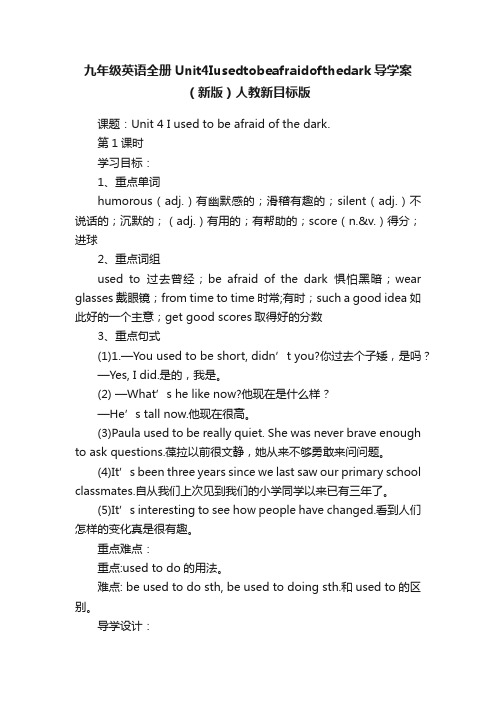
九年级英语全册Unit4Iusedtobeafraidofthedark导学案(新版)人教新目标版课题:Unit 4 I used to be afraid of the dark.第1课时学习目标:1、重点单词humorous(adj.)有幽默感的;滑稽有趣的;silent(adj.)不说话的;沉默的;(adj.)有用的;有帮助的;score(n.&v.)得分;进球2、重点词组used to过去曾经;be afraid of the dark惧怕黑暗;wear glasses戴眼镜;from time to time 时常;有时;such a good idea如此好的一个主意;get good scores取得好的分数3、重点句式(1)1.—You used to be short, didn’t you?你过去个子矮,是吗?—Yes, I did.是的,我是。
(2) —What’s he like now?他现在是什么样?—He’s ta ll now.他现在很高。
(3)Paula used to be really quiet. She was never brave enough to ask questions.葆拉以前很文静,她从来不够勇敢来问问题。
(4)It’s been three years since we last saw our primary school classmates.自从我们上次见到我们的小学同学以来已有三年了。
(5)It’s interesting to see how people have cha nged.看到人们怎样的变化真是很有趣。
重点难点:重点:used to do的用法。
难点: be used to do sth, be used to doing sth.和used to的区别。
导学设计:1. humorous adj. 有幽默感的; 滑稽有趣的The man is a humorous writer. 那个人是一个幽默的作家。
九年级英语上册unit4单元课时导学案(人教版)

九年级英语上册unit4单元课时导学案(人教版)课时一: Reading本节课的学习目标是阅读理解文章,掌握关键词和短语,提高阅读效果。
一、预习导引在本节课中,我们将阅读一篇关于长城的文章。
在阅读之前,请完成以下预习任务:1.快速浏览文章,了解文章的大致内容和结构。
2.找出并学习一些关键词和短语,例如“Great Wall”(长城)、“tourists”(游客)、“history”(历史)等。
二、阅读理解请认真阅读以下文章,并回答下面的问题:The Great Wall of ChinaThe Great Wall is a famous landmark in China. It is over 21,000 kilometers long. It was built thousands of years ago. It was built to keep out invaders.The Great Wall is made of stone, brick, and earth. It is very wide in some places, and very narrow in others. Some parts of the wall are quite steep.Every year, millions of tourists from all over the world visit the Great Wall. They come to learn about the history of China and to experience the grandeur of this ancient wonder.If you ever visit China, make sure you see the Great Wall. It is truly a sight to behold!问题:1.What is the Great Wall?2.Why was the Great Wall built?3.What is the Great Wall made of?4.What do tourists do when they visit the Great Wall?5.What is the author’s suggestion to readers?三、课堂讨论请同学们回答上面的问题,并进行一次课堂讨论。
Unit 4 导学案人教版九年级上册英语 Unit 4 导学案 Unit 4 导学案
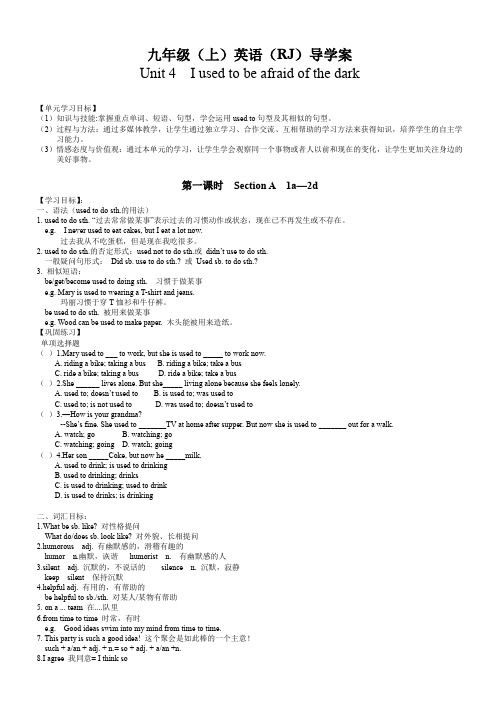
九年级(上)英语(RJ)导学案Unit 4 I used to be afraid of the dark【单元学习目标】(1)知识与技能:掌握重点单词、短语、句型,学会运用used to句型及其相似的句型。
(2)过程与方法:通过多媒体教学,让学生通过独立学习、合作交流、互相帮助的学习方法来获得知识,培养学生的自主学习能力。
(3)情感态度与价值观:通过本单元的学习,让学生学会观察同一个事物或者人以前和现在的变化,让学生更加关注身边的美好事物。
第一课时Section A 1a—2d【学习目标】:一、语法(used to do sth.的用法)1. used to do sth. “过去常常做某事”表示过去的习惯动作或状态,现在已不再发生或不存在。
e.g. I never used to eat cakes, but I eat a lot now.过去我从不吃蛋糕,但是现在我吃很多。
2. used to do sth.的否定形式:used not to do sth.或didn’t use to do sth.一般疑问句形式:Did sb. use to do sth.? 或Used sb. to do sth.?3. 相似短语:be/get/become used to doing sth. 习惯于做某事e.g. Mary is used to wearing a T-shirt and jeans.玛丽习惯于穿T恤衫和牛仔裤。
be used to do sth. 被用来做某事e.g. Wood can be used to make paper. 木头能被用来造纸。
【巩固练习】单项选择题()1.Mary used to ___ to work, but she is used to _____ to work now.A. riding a bike; taking a busB. riding a bike; take a busC. ride a bike; taking a busD. ride a bike; take a bus()2.She ______ lives alone. But she_____ living alone because she feels lonely.A. used to; doesn’t used toB. is used to; was used toC. used to; is not used toD. was used to; doesn’t used to()3.—How is your grandma?--She’s fine. She used to _______TV at home after supper. But now she is used to _______ out for a walk.A. watch; goB. watching; goC. watching; goingD. watch; going()4.Her son _____Coke, but now he _____milk.A. used to drink; is used to drinkingB. used to drinking; drinksC. is used to drinking; used to drinkD. is used to drinks; is drinking二、词汇目标:1.What be sb. like? 对性格提问What do/does sb. look like? 对外貌、长相提问2.humorous adj. 有幽默感的,滑稽有趣的humor n.幽默,诙谐humorist n. 有幽默感的人3.silent adj. 沉默的,不说话的silence n. 沉默,寂静keep silent 保持沉默4.helpful adj. 有用的,有帮助的be helpful to sb./sth. 对某人/某物有帮助5. on a ... team 在....队里6.from time to time 时常,有时e.g. Good ideas swim into my mind from time to time.7. This party is such a good idea! 这个聚会是如此棒的一个主意!such + a/an + adj. + n.= so + adj. + a/an +n.8.I agree 我同意= I think so表示不同意时用I don’t agree 或I disagree9.It’s been three years since we last saw our primary school classmates.自从我们上次小学同学见面以来已经有三年的时间了。
九年级英语Unit4学案
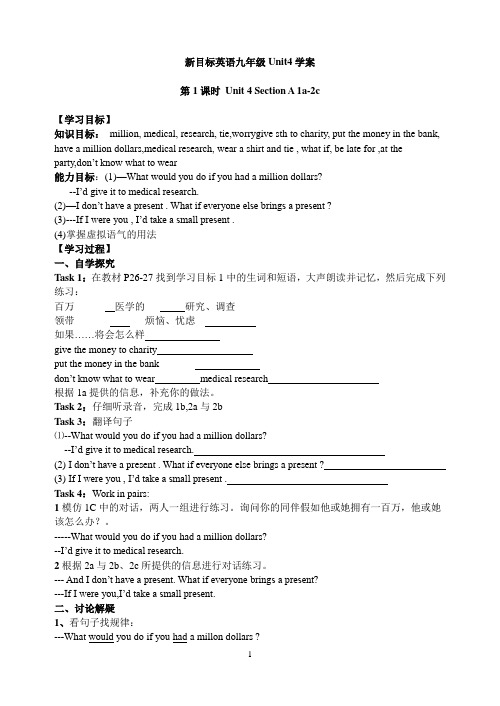
新目标英语九年级Unit4学案第1课时 Unit 4 Section A 1a-2c【学习目标】知识目标:million, medical, research, tie,worrygive sth to charity, put the money in the bank, have a million dollars,medical research, wear a shirt and tie , what if, be late for ,at theparty,don’t kn ow what to wear能力目标:(1)—What would you do if you had a million dollars?--I’d give it to medical research.(2)—I don’t have a present . What if everyone else brings a present ?(3)---If I were you , I’d take a small present .(4)掌握虚拟语气的用法【学习过程】一、自学探究T ask 1:在教材P26-27找到学习目标1中的生词和短语,大声朗读并记忆,然后完成下列练习:百万________医学的_____ _研究、调查___________领带_______ ___烦恼、忧虑__ _______如果……将会怎么样give the money to charityput the money in the bank________ _____don’t kno w what to wear medical research根据1a提供的信息,补充你的做法。
T ask 2:仔细听录音,完成1b,2a与2bT ask 3:翻译句子⑪--What would you do if you had a million dollars?--I’d give it to medical research.(2) I don’t have a present . What if everyone else brings a present ?(3) If I were you , I’d take a small present .T ask 4:Work in pairs:1模仿1C中的对话,两人一组进行练习。
九年级英语上册unit4单元课时导学案(人教版)

九年级英语上册unit4单元时导学案(人教版)Unit4IusedtbeafraidfthedarPerid一.学习新单词huru/hu:ərəs/a有幽默感的;滑稽的silent/sailənt/ad不说话的;沉默的helpful/helpfl/ad有用的;有帮助的frtiettie时常;有时sre/s`:/n≈v得分;打分bagrund/bægraund/n背景intervie/Intəvu:/v采访;面试n访谈Asian/eiʃn,/ad亚洲/人的;n亚洲人dealith对付;应付dare/deə/,/der/v敢于;胆敢private/praivət/ad私人的;私密的guard/ga:d/n警卫;看守v守卫;保卫require/riaiə/v需要;要求British/britiʃ/ad英国的;英国人的speeh/spi:tʃ/n讲话;发言ant/ænt/n蚂蚁inset/inset/n昆虫influene/influəns/v≈n 影响seld/seldə/adv不常;很少prud/praud/ad自豪的;骄傲的beprudf为⋯⋯骄傲;感到自豪absent/æbsənt/ad缺席;不在fail/feil/v失败;未能(做到)exainatin/igzæineiʃn/n考试;审查barding/b`:diŋ/shl`寄宿学校inpersn亲身;亲自exatl/igzætli/adv确切地;精确地pride/praid/n自豪;骄傲taepridein为⋯⋯感到自豪grandsn/græns>n/n孙子;外孙general/dDenrəl/a普遍的;常规的;总的n将军p32intrdutin/intrəd>ʃn/n 介绍p32Paula/p`:lə/葆拉(女名)p26Alfred/ælfrid/艾尔弗雷德(男名)p26Bill/bili/比利(男名)p26and/ændi/坎迪(女名)p27err/dDeri/杰里(男名);杰丽(女名)p28Eil/eili/埃米莉(女名)p28Perid2一.学习usedt的用法usedt的含义为“__________________”,是一个固定结构,其后跟动词原形,它表示过去的某种经常性,习惯性的行为或动作,并暗示现在已无此习惯。
人教版九年级英语全册Unit4单元优秀教学案例

(二)过程与方法
1.通过情景设定和角色扮演,让学生在实际语境中感知和运用一般过去时的被动语态。设计不同场景的对话,让学生在交流中自然而然地运用所学知识。
2.采用任务型教学法,引导学生参与各种互动活动,如小组讨论、问题解决等,激发学生的学习兴趣,提高学生的参与度和积极性。
3.通过总结,培养学生总结归纳的能力,提高学生的思维概括能力。
(五)作业小结
1.布置相关作业,让学生运用一般过去时的被动语态进行书写表达,巩固所学知识。
2.要求学生在作业中注意语法的正确性和表达的准确性,培养学生的书写习惯。
3.鼓励学生在日常生活中尝试运用一般过去时的被动语态,将所学知识运用到实际生活中。
3.教育学生关爱环境,关注社会。通过学习有关环保的文章,引导学生树立环保意识,养成节约资源、保护环境的良好习惯。
4.培养学生的同理心,让学生学会关爱他人,尊重不同文化背景和价值观。通过学习有关多元文化的话题,使学生具备跨文化交际的能力。
三、教学策略
(一)情景创设
1.结合学生的生活实际,创设贴近学生生活的情景,如学校活动、家庭生活、节日庆祝等,让学生在真实语境中感知和运用一般过去时的被动语态。
四、教学内容与过程
(一)导入新课
1.利用多媒体展示一张过去参加活动的照片,激发学生的回忆。引导学生用英语描述照片中的活动,复习一般过去时。
2.提出问题:“当时这个活动是如何进行的?”引导学生思考并回答,引出被动语态的概念。
3.简要介绍一般过去时的被动语态的构成和用法,激发学生的学习兴趣。
(二)讲授新知
3.小组合作培养学生团队协作:在学生小组讨论环节,教师给出一个场景,让学生以小组为单位进行讨论。通过小组合作,学生能够互相学习、交流,提高口语表达能力和团队协作能力。此外,小组合作也有利于培养学生的同理心和关爱他人的价值观。
英语九年级上册Unit 4第四课时导学案
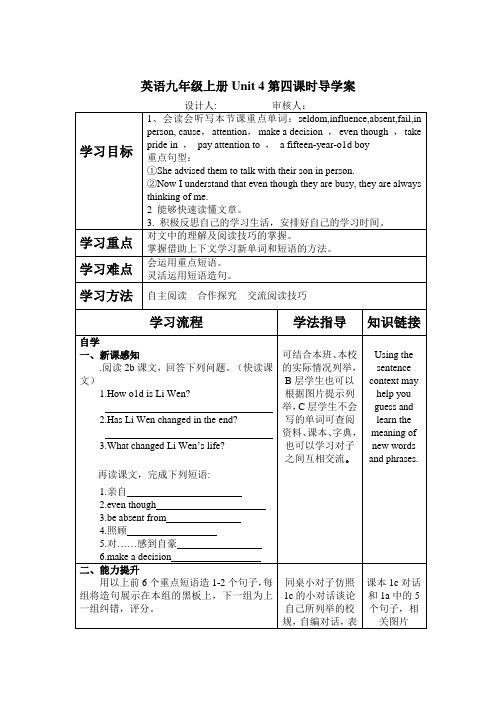
__________________________________
再读课文,完成下列短语:
1.亲自
2.even though
3.be absent from
4.照顾
5.对……感到自豪
6.make a decision
可结合本班、本校的实际情况列举,B层学生也可以根据图片提示列举,C层学生不会写的单词可查阅资料、课本、字典,也可以学习对子之间互相交流。
现在我明白了虽然他们很忙,但他们一直在想着我。他们为我所做的每一件好事感到自豪。
【精解】take pride in意为“对……感到自豪”,其同义短语为beproudof
中考链接:
We all take pride in Liu Xiang.(同义句转换) WeallLiu Xiang.
2.She advised them to talk with their son in person.
Using the sentence context may help you guess and learn the meaning of new words and phrases.
二、能力提升
用以上前6个重点短语造1-2个句子,每组将造句展示在本组的黑板上,下一组为上一组纠错,评分。
1、再读文章完成2b(把这四个句子填入文章中)和2c(勾出李文过去存在问题)
英语九年级上册Unit4第四课时导学案
设计人:审核人:
学习目标
1、会读会听写本节课重点单词:seldom,influence,absent,fail,in person,cause,attention,make a decision,even though,take pride in,pay attention to,a fifteen-year-o1d boy
最新人教版九年级英语上册第四单元学案

人教版九年级英语上册第四单元(dānyuán)学案Unit 4 What should you do?Section A一、教师寄语:Knowledge is a treasure,but practice is the key to it.二、学习目标:1.New words and phrases:million ,medical, research,tie,worry what if2.New sentences:a.What would you do if......b.If I had a million dollars,I would......c.If I were you ,I would......3.Grammar Focus: 虚拟语气三、重难点:a.虚拟语气的基本用法b.虚拟条件句与真实条件句的区别四、学习过程:1.预习导学:a. 假如你有一百万,你会做什么?________________________________________A: 这是虚拟语气,语气是动词的一种形式,表示说话人对说话内容的看法和态度英语的语气有三种: 陈述语气,祈使语气和虚拟语气. 虚拟语气表示说话人认为所说的话是和事实相反的内容,只是一种愿望.假设.猜测或空想,本单元是虚拟语气在非真实条件句中的运用,表示说话人所陈述的内容是与事实相反或难以实现的假设。
其结构是:条件句--- if + 主语 + 动词的过去式(be用were) 主句------主语+ would + 动词原形对应训练:1) 假如我有一百万,我会把钱捐献给医学研究. ______________________________________________________ ________2) 如果我是你,我会穿衬衣打领带._____________________________________________________3) 假如我是你,我就会迟一点去._____________________________________________________4) 假如我是你,我就会带一个小礼物._____________________________________________________5) 如果我是你,我会在睡觉前好好的散步。
九年级英语教案Unit4HesaidIwashard-working学案
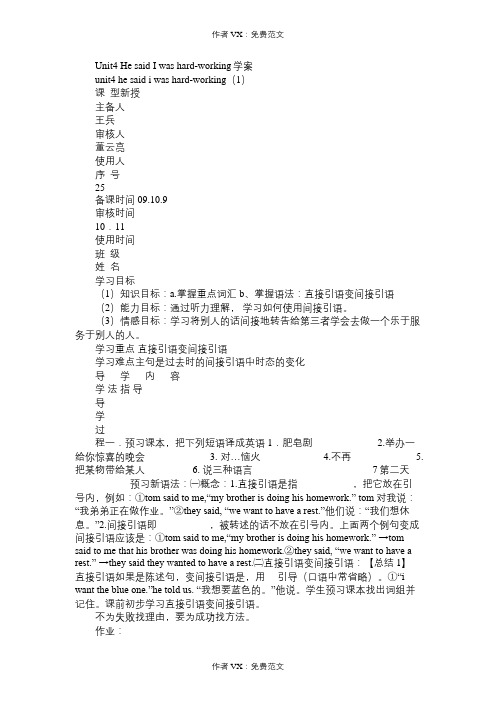
unit4 he said i was hard-working(1)课型新授主备人王兵审核人董云亮使用人序号25备课时间09.10.9审核时间10.11使用时间班级姓名学习目标(1)知识目标:a.掌握重点词汇 b、掌握语法:直接引语变间接引语(2)能力目标:通过听力理解,学习如何使用间接引语。
(3)情感目标:学习将别人的话间接地转告给第三者学会去做一个乐于服务于别人的人。
学习重点直接引语变间接引语学习难点主句是过去时的间接引语中时态的变化导学内容学法指导导学过程一.预习课本,把下列短语译成英语1.肥皂剧_____________2.举办一给你惊喜的晚会_____________3. 对…恼火____________ 4.不再_____________5.把某物带给某人 _________6. 说三种语言________________________7第二天___________预习新语法:㈠概念:1.直接引语是指,把它放在引号内,例如:①tom said to me,“my brother is doing his homework.” tom对我说:“我弟弟正在做作业。
”②they said, “we want to have a rest.”他们说:“我们想休息。
”2.间接引语即,被转述的话不放在引号内。
上面两个例句变成间接引语应该是:①tom said to me,“my brother is doing his homework.” →tom said to me that his brother was doing his homework.②they said, “we want to have a rest.” →they said they wanted to have a rest.㈡直接引语变间接引语:【总结1】直接引语如果是陈述句,变间接引语是,用引导(口语中常省略)。
新版人教版九年级英语上册Unit4单元导学案

2014年新版人教版九年级英语上册Unit4单元导学案刘营初中九年级英语五步案执笔龚琴审核初三英语组课型听说课课时1 授课人授课时间姓名学案编号N【课题】Unit 4 I used to be afraiddaA 1a-1c教师复备栏或学生笔记栏【学习目标】1 熟练运用used to do sth谈论自己、他人过去的习惯、爱好、形象及经常做的事情。
2 能够听懂有关学习方法的简短对话。
3能运用used to 来谈论过去。
【学习重点难点】1熟记重点单词短语。
2 正确使用used to 【学法指导】谈论自己和同学的变化----听读感受别人的变化---巩固练习【教学过程】【教学过程】一、导入(启发探究 3分钟)used to的用法“used to+动词原形”表示过去常常干某事,现在不在干了。
只有一种形式,即过去式。
例如:I used to go to work by bus. Now I take a tax“I used to be afraiddark.” mea:我过去常害怕黑暗。
“used to”的疑问形式和否定形式:—Did you use to be afraiddark?—Yes, I used to be afraidda—Did he use to be afraiddark?—No, he did not use to be afraidda_There used to be a chudidn ‘?跟踪练习(1) He______ ______ ____ al. 放学后他过去常常踢足球。
(2) He ____ ______ _____ __________________. 他过去不吸烟。
(3)He used to play football. (改为一般疑问句,再回答)_________________________________________________ ______朗读,体会used to的用法Bob: Wow, Mario, you look d! You used to bdidn’tyou?Mario: Yes, I did. Now I’m tall. And so are you!Bob: That’s true. And you used to wear glasses. Amy: Hi, Bob. How are you?Bob: Fine. Wow, you’ve changed!Amy: Really? How?Bob: You used to havaAmy: You remember that? Yes,I did.二、自学(自主探究 6分钟)朗读、翻译短语I haven’u for four years! a couple of daNow I’m tall. And so are you! you used to wear glau’ve changed! You used to havau used to be really tall! Not aused to be red, didn’t it? it used to be curly. You used to bdidn’t you? 复习反意疑问句,完成练习:(1)Lily will ga, ______ _____?(2)She doesn’a, ________ ________?(3) You haven’d homework, _________ __ ?(4) He knows little English, _________ ______?三、交流(合作探究 10分钟)注意谈论外貌和性格的不同句型What’like ?What dlook like?完成1a两人一组谈论自己过去的外表、性格等及与现在的不同。
英语九年级上册Unit第四课时导学案
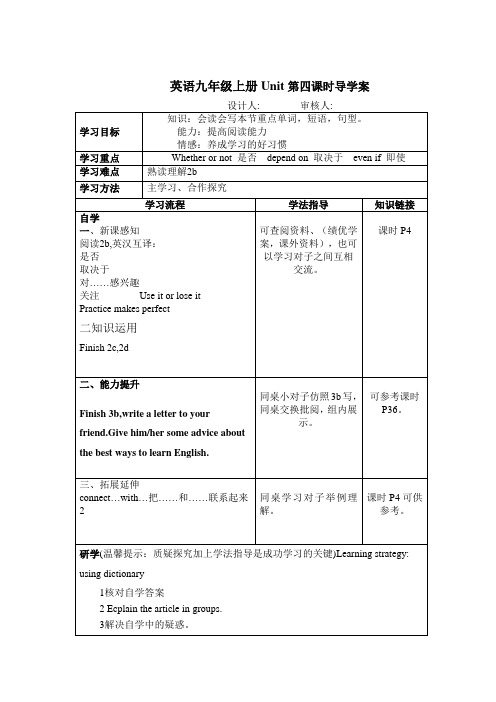
1.____you’ve tasted it,you can’t imagine how delicious the dishes are.
A Because B Although C When D Unless
2即使你学得好,你也会忘记的,除非你用它。_____if you learn something well,you will forget it____you use it.
阅读2b,英汉互译:
是否_____________
取决于___________
对……感兴趣_______
关注________Use it or lose it________
Practice makes perfect___________
二知识运用
Finish 2c,2d
可查阅资料、(绩优学案,课外资料),也可以学习对子之间互相交流。
重难点突破
unless的用法
unless是连词,意为“如果不,除非”。引导条件状语从句,含有否定意义,相当于if not。如果主句时态为一般将来时,unless引导的从句要用一般现在时,而不用将来时。
You will miss the bus unless you hurry up.
你不快点,你就会错过公交车。
英语九年级上册Unit第四课时导学案
设计人:审核人:
学习目标
知识:会读会写本节重点单词,短语,句型。
能力:提高阅读能力
情感:养成学习的好习惯
学习重点
Whether or not是否depend on取决于even if即使
学习难点
熟读理解2b
学习方法
主学习、合作探究
学习流程
学法指导
- 1、下载文档前请自行甄别文档内容的完整性,平台不提供额外的编辑、内容补充、找答案等附加服务。
- 2、"仅部分预览"的文档,不可在线预览部分如存在完整性等问题,可反馈申请退款(可完整预览的文档不适用该条件!)。
- 3、如文档侵犯您的权益,请联系客服反馈,我们会尽快为您处理(人工客服工作时间:9:00-18:30)。
Unit 4 I used to be afraid of the dark课 时:第一课时(Section A (1a-2d)) 主备人: 闫勤奋学习目标:1 .学习并掌握重点词汇和重要句型。
a. Key vocabulary: outgoing, friendly, serious, quiet, curly hair, straight hairb. Target language: I use to be quiet. / She used to have long hair./..2. 学会应用used to 谈论过去发生的事情。
3. To learn the usage of the structure used to.eg. ---You used to be short, didn't you?--- Yes, I did. / No, I didn't. He is tall.--- Did Tony use to play the piano?---Yes, he did. / No, he didn't.4.They didn't use to like tests.学习重点:1.单词及词型。
ed to 的用法【课前尝试】(一)听读本单元词汇3~~5遍,并熟读。
(二)短语翻译1. 过去常常2 .害怕做某事3 .戴眼睛 ____4 .留着红色、卷曲的头发____ ___5 .时常,有时__________ 6.第一次(三)词形转换1. short(对应词)__________ 2.curly (对应词)___________3.quiet (对应词)___________________ 4 .is (原形)_____________________ 5. funny ((对应词) _________________ 6. used (原形) ___________________ 7. shyl (名词)____________________ 8. does (过去式)__________________9.interesting (比较级)____________ 10. were not (缩写形式)______________【课堂探究】一.合作探究:1.Discuss: What did you use to like to do when you were a child?2.Discuss: What did your mother / your father use to be when she/he was young?3.Discuss: What did your best friend use to be do when she/he was a child ? 二.知识点2. remember 的用法(还有它的反义词啊)3. used to 的用法及与be used to doing sth 的区别【课后检测】一.根据汉语提示完成句子【作业设计】一.根据句意及首字母提示完成单词5. I'm t of the snake.二.根据要求完成句子,每空一词。
1.I used to be shy and quiet. (改为一般疑问句) ____ you _____ to be shy and quiet?2. He used to wear old jeans. (改为否定句) He ______ ____ to wear old jeans.3. Lily used to be funny. (就画线部分提问) _____ ____ he ____ to be ____?Unit 4 I used to be afraid of the dark课时:第二课时(SectionA 3a-4c)主备人:闫勤奋学习目标:1.学习完成Section A的3a~~4的内容,听读并继续练习used to的用法2.学习并掌握一些短语及知识点。
3.重点词汇、短语:the dark, being alone, snakes, flying in an airplane, high place,speaking in front of a group学习重点:1.短语及知识点。
2. Used to与be used to的用法及区别【课前尝试】一、拼读单词、记忆含义。
1.background ___________2.interview ___________n ___________4.deal with ___________5.dare ___________6.private ___________7.guard /ga:(r)d/ ___________8.require ___________二、勾画3a里的重点短语,翻译并背诵。
1)19-year-old Asian pop star ___________ 2)in front of ___________3)dare to do ___________ 4)appear to others ___________5)take up ___________ 6)deal with处理;对付___________7)not ... anymore ___________ 8)all the time总是;一直___________9)get tons of attention ___________ 10)give up ___________11)fight on ___________ 12)a number of ___________【课堂探究】1. what did Candy Wang use to be ? but now?2. How was Candy Wang different after she become famous?3.What does Candy have to say to all those young people who want be famous?『课后检测』(一)用所给词的适当形式填空1. I used to be afraid of_________ (be) alone .2. She ___________(use) to be late last year?3. Steve didn’t ___________ (use) to have short hair.4. I’m ______________ (interest)in music than before.5. Are you terrible of ___________(speak) in front of a group?6. --- How about ___________ (swim), Mary ? --- Good idea.7. He ___________ (be) still miss me .8. The little boy used to cry, ___________ (do) he ?(二)根据汉语完成句子1.你过去真的非常内向,不是吗?You _________ _________ _________ really quiet. __________ you ?2. Miss Zhang一直对我们很友好,不是吗?Miss Zhang ________ always _________ _________ us, ___________ she ?3 怕黑你怎么办呢?_____ _____ you ______ about____ afraid ____ the dark ?4 我开着卧室的灯睡觉。
I_________ _________ ______ _______ my bedroom _________ _________ .5 ---过去你的父母经常通过电视看足球赛吗?---不。
_________ your parents ______-__ _________ _________ football games ?No, ____________ ___________ .【作业设计】一.请用“used to + V”按要求造句1.肯定句:________________________4 由where构成的特殊疑问句:____________________________Unit 4 I used to be afraid of the dark课时:第三课时(SectionB1a-1e)主备人:闫勤奋学习目标: 1.掌握所学词汇。
2.掌握用used to 介绍自己过去的情况。
学习重点: 1. 掌握用used to 介绍自己过去的情况2.培养学生的听力能力。
【课前尝试】(一)词形转换1.terrify(形容词)2.fly(现在分词)3.friend(形容词)4.worry(形容词)5.be made up of(同义词短语)(二)将下列短语译成英语1.我最大的问题2.直接回家3.和某人聊天4.带某人去听音乐会 5.怀念过去的时光6.在过去的几年里【课堂探究】(三)知识点:1.spend\take\pay\cost的用法.2. not….any more的用法及同义词的用法3.给出I hardly ever have time for concerts 的反义疑问句4.I hardly ever have time for concerts,『课后检测』(一)根据句意和首字母提示完成单词1.My d life is different from you.2.Do you like to c gum?3.I used to eat c ,but now I don’t .The doctor said it was bad for my teeth.4.She is a famous singer . She gave a c in our city yesterday.5.Do you m the old days?(二)选择填空1.The young man drove his car fast with the car lightA.inB.onC.atD.to2.Do you mind my the window ,Jack?A.openB.openingC.to openD.openning3.Do you often get on-line and with your friends?A.chatedB.chattingC. chattedD.chat4.The mother seemed her son.A.worry aboutB.worried toC.to worryD.worried about5.I have changed these years.A.a lotB.a lot ofC.lotsD.lots of【作业设计】一.句型转换1.How did you use to be? (改为同义句)did you use to be ?2.I’ll go out. I’ll play football with my classmates.(合并为一句)I’ll go out play football with my classmates.3.He runs faster than the other two.(改为同义句)He runs the three.4.He often went swimming in that river when he was young,(改为同义句)He go swimming in that river when he was young.Unit 4 I used to be afraid of the dark课时:第四课时(Section B 2a-2e)主备人:闫勤奋学习目标:1.学习并掌握sectionB(3a---4b)的单词和短语。
